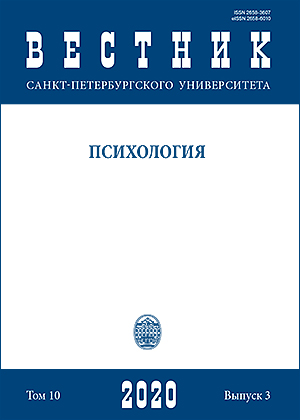Assessment of emotional and behavioural problems among children with autism spectrum disorder using the CBCL/1½-5
DOI:
https://doi.org/10.21638/spbu16.2020.305Abstract
The article presents the results of a study of emotional and behavioural features of children with autism spectrum disorder (ASD) using the Child Behaviour Checklist (CBCL/1.-5). The use of this instrument to assess behavioural disorders and as a screening method in children with autism spectrum disorder is a new area of its application. Studies conducted previously in Europe, the USA, and South Korea have demonstrated that the DSM-Pervasive Development Problems and Withdrawal scales are the most sensitive in detecting autism spectrum disorder at the preschool age. We have not found any studies performed on a Russian sample of children in which behavioural features were studied using the CBCL/1.-5 method in children with ASD. Participants of the study included 28 children with ASD (average age: 52,9 Å} 8,7 months) who were diagnosed by a psychiatrist during examination in the Stavropol Clinical Psychiatric Hospital №1 and 29 typically developed children aged (average age: 35,8 +/- 9,4). Behavioural features of children were investigated by using the Children Behaviour Check List CBCL/1.-5. The results indicated that in the group of children with autism spectrum disorder, indicators on the DSM-Pervasive Development Problems and Withdrawal scales are at a clinical level of severity. Compared with typically developing children, the ASD sample had significantly high scores for DSM-Pervasive Development Problems, DSM — Affective Problems, DSM — Attention Deficit /Hyperactivity, DSM Oppositional Defiant Problems scales and syndromes Emotionally Reactive, Somatic Complaints, Withdrawal, Attention Problems, and Aggressive Behaviour Withdrawal scales. There was no correlation found between the frequency of exceeding critical indicators of manifestations in regard to violations of communication with the sex of children, level of education and marital status of mothers, and the number of children in families in both groups.
Keywords:
autism spectrum disorder, CBCL/1½-5, behaviour problems, preschoolers
Downloads
References
References
Downloads
Published
How to Cite
Issue
Section
License
Articles of "Vestnik of Saint Petersburg University. Psychology" are open access distributed under the terms of the License Agreement with Saint Petersburg State University, which permits to the authors unrestricted distribution and self-archiving free of charge.




